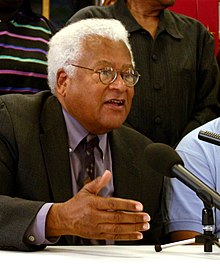James Lawson (American activist)
| James Lawson | |
|---|---|

James Lawson speaking at a community meeting in Nashville, Tennessee in 2005
|
|
| Born |
James Morris Lawson, Jr. September 22, 1928 Uniontown, Pennsylvania |
| Residence | Nashville, Tennessee |
| Nationality | American |
| Occupation | Activist Professor |
| Known for | Mahatma Gandhi, Civil Rights leader, political and social activist |
James Morris Lawson, Jr. (born September 22, 1928) is an American activist and university professor. He was a leading theoretician and tactician of nonviolence within the Civil Rights Movement. During the 1960s, he served as a mentor to the Nashville Student Movement and the Student Nonviolent Coordinating Committee. He continues to train activists in nonviolence.
Lawson was born to Philane May Cover and James Morris Lawson, Sr., on September 22, 1928 in Uniontown, Pennsylvania. He grew up in Massillon, Ohio. Both Lawson's father and grandfather were Methodist minsters. Lawson received his ministry license in 1947 during his senior year of high school.
While a freshman at Baldwin Wallace College in Berea, Ohio, he joined the Fellowship of Reconciliation (FOR), an organization led by A. J. Muste, and the Congress of Racial Equality (CORE), an organization affiliated with FOR. Both FOR and CORE advocated nonviolent resistance to racism; CORE conducted sit-ins in some northern cities in the late 1940s and embarked on a freedom ride more than a decade before the more famous ones of the early 1960s. Consistent with those principles of nonviolence, he declared himself a conscientious objector and refused to report for the draft in 1951. He served fourteen months in prison after refusing to take either a student or ministerial deferment.
After his release from prison, he went as a Methodist missionary to Nagpur, India, where he studied satyagraha, the principles of nonviolence resistance that Mohandas Gandhi and his followers had developed. He returned to the United States in 1955, entering the Graduate School of Theology at Oberlin College in Ohio. One of his Oberlin professors introduced him to Martin Luther King, Jr., who had led the Montgomery Bus Boycott in Montgomery, Alabama and had also embraced Gandhi's principles of nonviolent resistance. King urged Lawson to come South, telling him, "Come now. We don't have anyone like you down there."
...
Wikipedia
